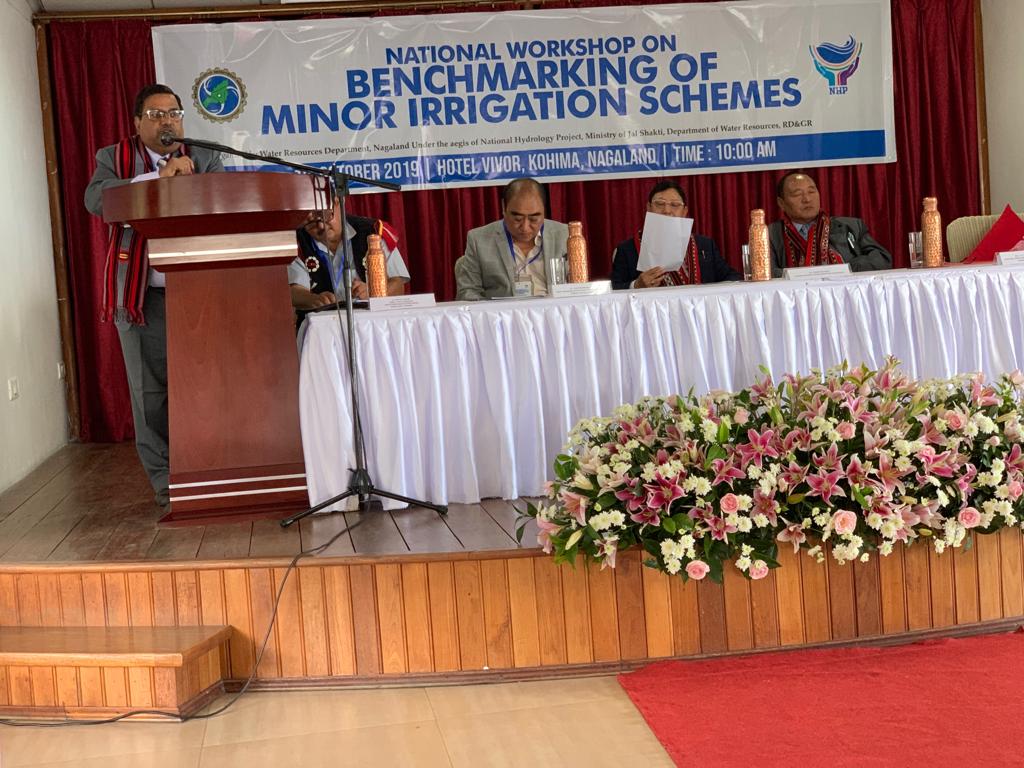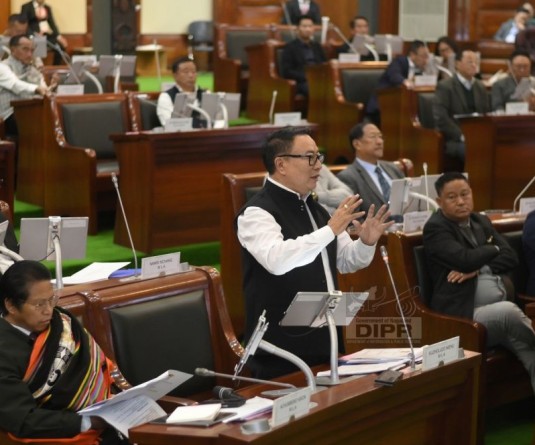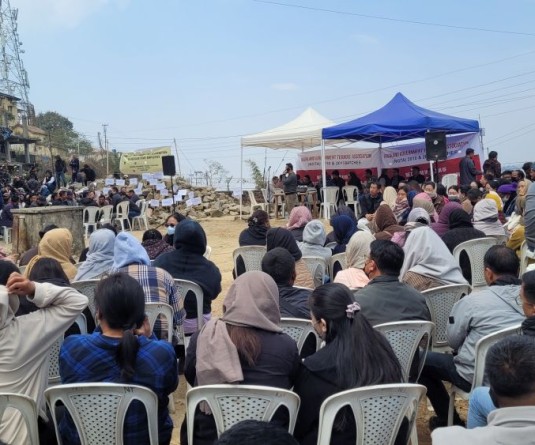National workshop on Benchmarking of Minor Irrigation Schemes held

Amrendra Kumar Singh, Chief Engineer (POMIO),CWC at the inaugural session of the National Workshop on Benchmarking of Minor Irrigation Schemes in Kohima, on October 19. (Photo Courtesy : Central Water Commission @CWCOfficial_GoI/Twitter)
National workshop on Benchmarking of Minor Irrigation Schemes held
Morung Express News
Kohima | October 18
The National workshop on ‘Benchmarking of Minor Irrigation Schemes’ was held on October 18 at Hotel Vivor, Kohima.
Keeping in view the challenges of water crisis across the country, the workshop was organised by the Water Resources Department, Nagaland under the aegis of National Hydrology Project, Ministry of Jal Shakti, Department of Water Resources, RD & GR.
Considering the regional specificities of the NE states, OT Chingmak Chang, IAS, Principal Secretary to Government of Nagaland, Water Resources Department & Project Coordinator, NHP shared the problems the region faced especially during the monsoon period. The IAS noted that the monsoon related catastrophe usually make agriculture an unproductive and unprofitable activity. Therefore, he requested all NE States to work on policies and 'special fundings' specific to the region.
In his opening remarks, Er Tsuktinungsang, Chief Engineer & Nodal Officer NHP mentioned about the Government of India cabinet's approval which launched the NHP Phase 3 that involved 49 Implementing Agency in the country including Nagaland. With the looming threat of global warming and climate change, the Chief Engineer stressed on the need for such irrigation projects in the State. Er Tsuktinungsang also informed that the State has pre finalised the budget with the authorities at CWC Delhi at 22.54 crores. "Our date with Delhi to finalise the final budget is slotted on October 22," mentioned the Chief Engineer.
Dr K J Anadha Kumar, Scientist -D (Deputy Director) at National Hydrology Project, Ministry of Jal Shakti today emphasised on the essence of reviving and developing the indigenous knowledge of storing and preserving water. “We are facing problems mainly because of population growth, no doubt. Even then we have also forgotten the indigenous way of saving water,” said Dr Kumar asserting that water resources should be managed judiciously. We have enough water in the country, however it is mostly wasted, viewed Dr Kumar.
In the case of Kohima with landslide occurrences each year, the Scientist stated, "Landslide is related to water. If you allow water to stagnate it results in landslide." Dr Kumar further cited the lack of proper channels, drainages for water to pass through in Kohima, which is a cause of landslide.
Voicing the value of water and the drinking water crisis today, Dr K J Anadha Kumar, Scientist -D (Deputy Director) NPMU stated that each state must emulate the best practices of water preservation from each other. These will require good quality data, and real time data, said Dr Kumar.
The need for benchmarking was further emphasised by Amarendra Kumar Singh, Chief Engineer, CWC, New Delhi who also shared the Government's focus on providing accessibility of efficient drinking water to its citizens. Singh stressed that today 80 percent of the water in the country is going towards agricultural demands amidst the growing need of drinking water with the increase in population. “We should evaluate our irrigation system and see how efficiently we are working to save water,” said Singh.
Namri Nchang, Advisor, Water Resources noted that the workshop is an opportune time to discuss problems of mutual interests with delegates from various states, thus expressing positive outcomes to emerge out of the workshop. Nchang also mentioned that this will be the first time for Nagaland to carry out studies on benchmarking of minor irrigation projects under National Hydrology Project.
The workshop discussed on the topic 'Benchmarking for enhancing irrigation efficiency and water productivity in irrigation commands', 'Benchmarking irrigation projects in India-a case study', 'Irrigation scenario in Nagaland', 'Challenges for irrigated agriculture and key indicators to assess its effectiveness', 'Ensuring water security through climate smart water technologies for sustainable hill agriculture'.






